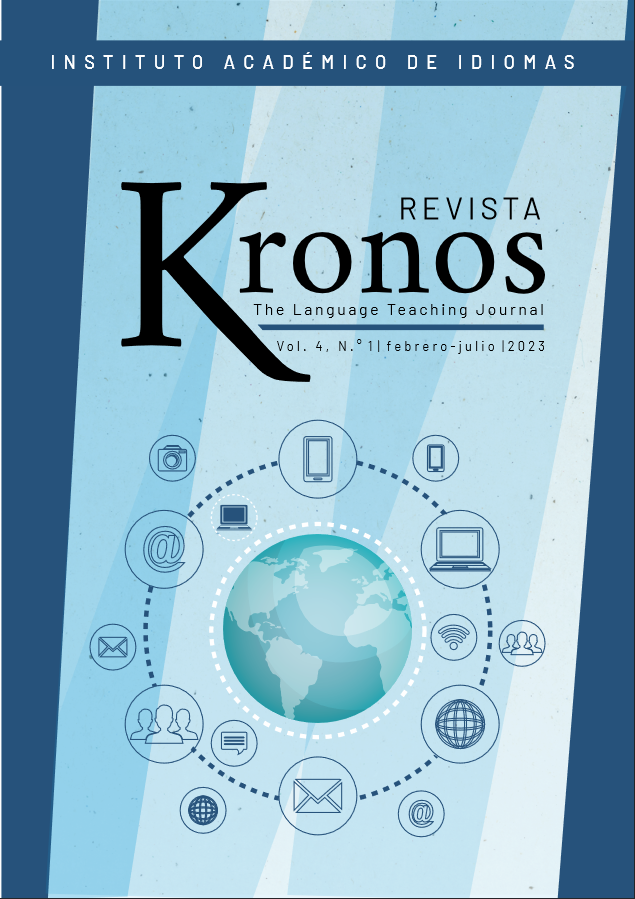A reflection on community-service activities: Influence of teaching-learning through community-service activities in undergraduate students.
DOI:
https://doi.org/10.29166/kronos.v4i1.4246Keywords:
Service-learning, English education, reflection, undergraduate education, community service, vocational trainingAbstract
Service-learning constitutes a relatively new activity in Ecuadorian higher education contexts, which aims to provide the community in need with a service while the participating undergraduate students learn about their future profession while practicing in real contexts. This article presents the importance of changes and reflection that the aforementioned Pedagogía de los Idiomas Nacionales y Extranjeros (PINE) students experienced during the service-learning practices included in their curriculum. Apprentices who participated in this research were invited to an in-depth interview. They were asked to tell their stories and experiences during their involvement in projects where they taught English to children from 5 to 11 years old in a virtual modality in different PINE programs in the last year. These interviews were later analyzed using the narrative analysis method in its content analysis form, which consists of listening to the testimonies, after recording, transcribing, and coding them, extracting only the most relevant information for the research from students’ narratives. After analyzing the interviews, the data showed that PINE students, after a time frame of participating in the aforementioned activities, experienced plenty of changes in their practices when it comes to their professional training linked to the community and reflection played a key role in that process. After the analysis, the results show that students’ exposure to service-learning practices greatly influenced their perceptions about teaching and the practices they consider important during formal instruction.
Downloads
References
Blouin, D. D., & Perry, E. M. (2009). Whom Does Service Learning Really Serve? Community-Based Organizations’ Perspectives on Service Learning. Teaching Sociology, 37(2), 120–135. https://doi.org/10.1177/0092055X0903700201
Bringle, R. G., & Hatcher, J. A. (1996). Implementing Service Learning in Higher Education. The Journal of Higher Education, 67(2), 221. https://doi.org/10.2307/2943981
Bruce‐Davis, M., & Chancey, J. (2012). Connecting students to the real world: Developing gifted behaviors through service learning. Psychology in the Schools, 49. https://doi.org/10.1002/pits.21622
Clandinin, D. J., & Caine, V. (2008). Narrative Inquiry. In The SAGE Encyclopedia of Qualitative Research Methods. SAGE Publications, Inc. https://doi.org/10.4135/9781412963909.n275
Deba, A. A., Jabor, M. K., Buntat, Y., & Musta’mal, A. H. (2014). Potential of service-learning on students’ interpersonal skills development in technical and vocational education. Asian Social Science, 10(21), 1.
Francis, M. (2018). A Narrative Inquiry Into the Experience of Being a Victim of Gun Violence. Journal of Trauma Nursing, 25(6), 381–388. https://doi.org/10.1097/JTN.0000000000000406
Lambright, K. (2008). Lessons Outside of the Classroom: Examining the Effectiveness of Service Learning Projects at Achieving Learning Objectives. Journal of Public Affairs Education, 14(2), 205–217. https://doi.org/10.1080/15236803.2008.12001520
Lieblich, A., Tuval-Mashiach, R., & Zilber, T. (1998). Narrative Research: Reading, Analysis, and Interpretation (Vol. 47). SAGE Publications, Inc. https://us.sagepub.com/en-us/nam/narrative-research/book8018
Miller, M. (2012). The role of service-learning to promote early childhood physical education while examining its influence upon the vocational call to teach. Physical Education & Sport Pedagogy, 17(1), 61–77. https://doi.org/10.1080/17408981003712810
Moen, T. (2006). Reflections on the Narrative Research Approach. International Journal of Qualitative Methods, 5(4), 56–69. https://doi.org/10.1177/160940690600500405
Ojala, J. (1997). Lost in space? The concepts of planetary phenomena held by trainee primary school teachers. International Research in Geographical and Environmental Education, 6(3), 183–203. https://doi.org/10.1080/10382046.1997.9965047
Oleson, A., & Hora, M. T. (2014). Teaching the way they were taught? Revisiting the sources of teaching knowledge and the role of prior experience in shaping faculty teaching practices. Higher Education, 68(1), 29–45. https://doi.org/10.1007/s10734-013-9678-9
Pajares, F. (1993). Preservice Teachers’ Beliefs: A Focus for Teacher Education. Action in Teacher Education, 15(2), 45–54. https://doi.org/10.1080/01626620.1993.10734409
Prentice, M., & Robinson, G. (2010). Improving Student Learning Outcomes with Service Learning. Higher Education. https://digitalcommons.unomaha.edu/slcehighered/148
Procee, H. (2006). Reflection in Education: A Kantian Epistemology. Educational Theory, 56(3), 237–253. https://doi.org/10.1111/j.1741-5446.2006.00225.x
Savin-Baden, M., & Niekerk, L. V. (2007). Narrative Inquiry: Theory and Practice. Journal of Geography in Higher Education, 31(3), 459–472. https://doi.org/10.1080/03098260601071324
Universidad San Francisco de Quito. (2022). Programa de Aprendizaje y Servicio (PASEC) | Universidad San Francisco de Quito. https://www.usfq.edu.ec/es/programa-de-aprendizaje-y-servicio-pasec
Ward, J. R., & McCotter, S. S. (2004). Reflection as a visible outcome for preservice teachers. Teaching and Teacher Education, 20(3), 243–257. https://doi.org/10.1016/j.tate.2004.02.004
Wells, K. (2011). Narrative Inquiry. Oxford University Press.
Whitney, A. E., Olan, E. L., & Fredricksen, J. E. (2013). Experience Over All: Preservice Teachers and the Prizing of the “Practical.” English Education, 45(2), 184–200. https://www.jstor.org/stable/23364877
Published
How to Cite
Issue
Section
License
Copyright (c) 2023 Sandra Jazmin Gonzalez Gonzalez

This work is licensed under a Creative Commons Attribution-NonCommercial-ShareAlike 4.0 International License.












